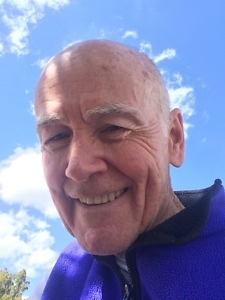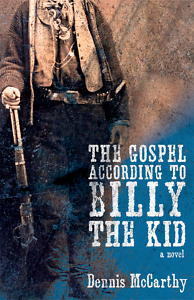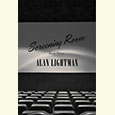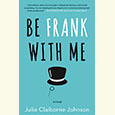Reconstructing a Western Myth
In his debut novel, Dennis McCarthy imagines an alternate fate for history’s most notorious gunslinger
Near the conclusion of Dennis McCarthy’s The Gospel According to Billy the Kid, that most notorious of outlaws confronts his friend and nemesis Pat Garrett for the last time, in Fort Sumner, New Mexico — only in McCarthy’s account, the meeting occurs not in 1881 but 15 years later, after Billy returns from a sojourn in California to discover that, thanks to Garrett’s false account of his infamous end, he has been transformed from outlaw into legend. “I showed him a Billy he never knowed. He laughed. Said he’d written about a Billy I never knowed.”
 The Gospel According to Billy the Kid manages to be both an homage to the Western genre and a thoughtful critique of the ways in which fact is fashioned into myth. McCarthy begins with the popular premise that Billy the Kid survived that fateful encounter with Pat Garrett in 1881; the tale is told by Billy himself, in 1914. Billy narrates the events leading up to the 1878 Lincoln County War, a violent conflict between rival ranchers that culminated in a five-day gunfight on the streets of Lincoln, New Mexico, and went on to inspire dozens if not hundreds of interpretations, from contemporaneous dime novels to more than half a dozen Western films. McCarthy’s novel leans on decades of research — attempting to filter fact from fiction in a time and place when even eye-witness accounts were dubious — and delivers an adventurous but comparatively sober and unromantic accounting of events and characters familiar to aficionados of “Old West” outlaw narratives.
The Gospel According to Billy the Kid manages to be both an homage to the Western genre and a thoughtful critique of the ways in which fact is fashioned into myth. McCarthy begins with the popular premise that Billy the Kid survived that fateful encounter with Pat Garrett in 1881; the tale is told by Billy himself, in 1914. Billy narrates the events leading up to the 1878 Lincoln County War, a violent conflict between rival ranchers that culminated in a five-day gunfight on the streets of Lincoln, New Mexico, and went on to inspire dozens if not hundreds of interpretations, from contemporaneous dime novels to more than half a dozen Western films. McCarthy’s novel leans on decades of research — attempting to filter fact from fiction in a time and place when even eye-witness accounts were dubious — and delivers an adventurous but comparatively sober and unromantic accounting of events and characters familiar to aficionados of “Old West” outlaw narratives.
After Billy’s rendezvous with Sherriff Pat Garrett in 1881, however, McCarthy departs into his own mythic territory, having Billy escape to California, where he attempts to make peace with his past. Years later, Billy returns to New Mexico with a new legend to tell and seeks out Pat Garrett en route to Cuba, where he will join up with Teddy Roosevelt’s Rough Riders in hopes of finding fortune and glory in the Spanish-American War.
 The tale McCarthy tells via Billy does not sidestep the problematic nature of Manifest Destiny, particularly regarding its consequences for the indigenous peoples of the West, especially the Comanche and Apache nations. But he does so without sentiment, from the perspective of a hardscrabble son of Irish immigrants conditioned by poverty and violence to see life as a kill-or-be-killed proposition.
The tale McCarthy tells via Billy does not sidestep the problematic nature of Manifest Destiny, particularly regarding its consequences for the indigenous peoples of the West, especially the Comanche and Apache nations. But he does so without sentiment, from the perspective of a hardscrabble son of Irish immigrants conditioned by poverty and violence to see life as a kill-or-be-killed proposition.
It can’t go unmentioned that debut novelist McCarthy, a Knoxville native, is the brother of Cormac McCarthy, perhaps the most acclaimed living practitioner of the so-called “revisionist Western” narrative. Both McCarthys share an interest in the tension between the power of myth and the brutal realities of life among violent, desperate people in treacherous landscapes. Cormac McCarthy has allegedly declared Melville’s Moby Dick to be his favorite novel; Dennis McCarthy begins The Gospel of Billy the Kid with a telling epigraph from that book: “doubts of all things earthly, and intuition of some things heavenly; this combination makes neither believer nor infidel, but makes a man who regards both with equal eye.”
Early on, McCarthy’s Billy claims to have twice read The Iliad, which led him to regard Achilles as “a warrior to model your life after.” In hindsight, Billy disavows this judgment, but the implication is clear: Myths fuel romantic delusions about the glory of violence, which, in turn, fuel more myths. The Gospel According to Billy the Kid manages somehow to tell this truth and nevertheless provide many of the same pleasures found in the myths themselves — despite, if not because of, their complex and troubling origins.

Ed Tarkington is the author of two novels, The Fortunate Ones and Only Love Can Break Your Heart. He lives in Nashville.


